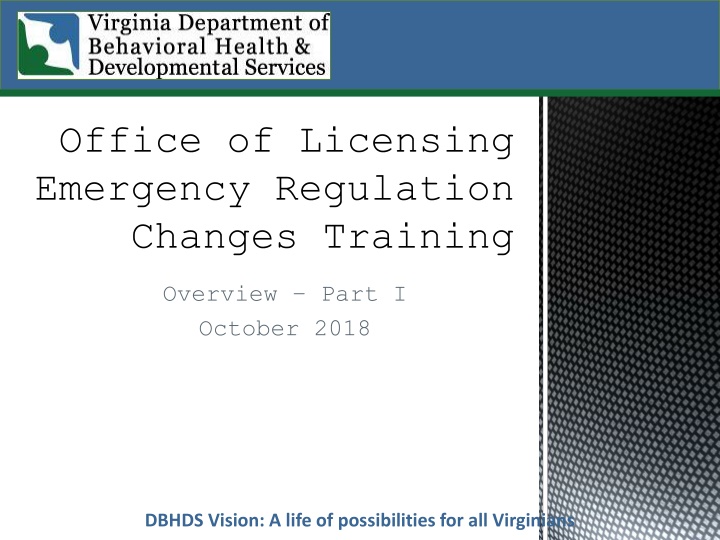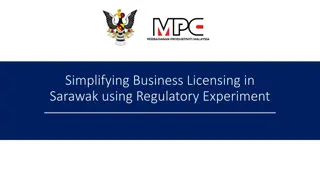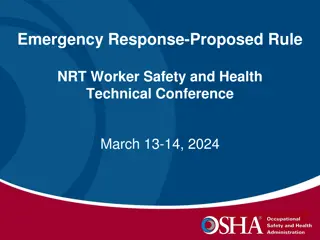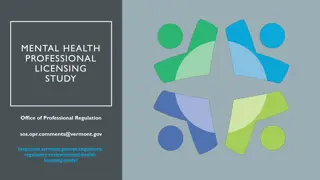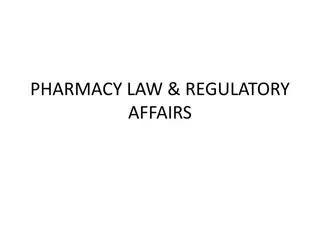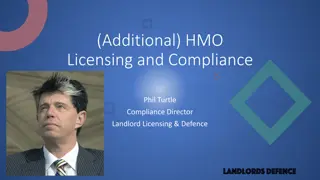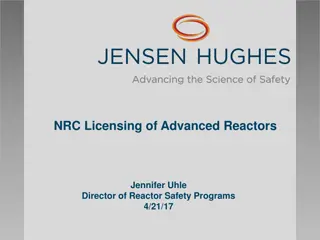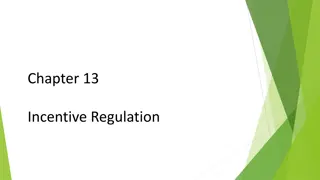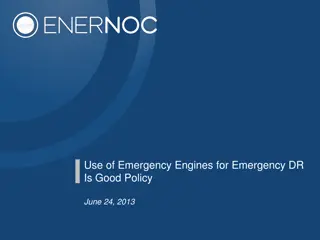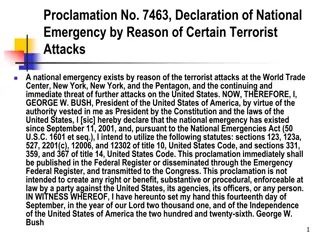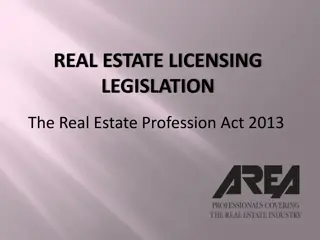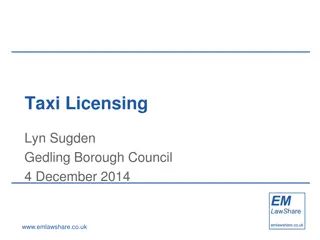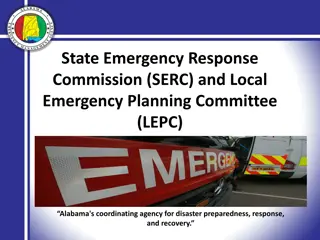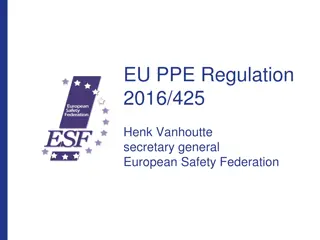Overview of Licensing Emergency Regulation Changes - October 2018
The Office of Licensing Emergency Regulation Changes Training Overview for October 2018 focuses on ensuring compliance with quality and risk management systems for adult service providers in Virginia. The amendments aim to enhance practices for health, safety, and care, impacting all providers licensed by DBHDS.
Download Presentation

Please find below an Image/Link to download the presentation.
The content on the website is provided AS IS for your information and personal use only. It may not be sold, licensed, or shared on other websites without obtaining consent from the author.If you encounter any issues during the download, it is possible that the publisher has removed the file from their server.
You are allowed to download the files provided on this website for personal or commercial use, subject to the condition that they are used lawfully. All files are the property of their respective owners.
The content on the website is provided AS IS for your information and personal use only. It may not be sold, licensed, or shared on other websites without obtaining consent from the author.
E N D
Presentation Transcript
Office of Licensing Emergency Regulation Changes Training Overview Part I October 2018 DBHDS Vision: A life of possibilities for all Virginians
Overview of Changes The intent of this regulatory action is to ensure compliance with the requirements of the Quality and Risk Management System outlined in Section V. of the Settlement Agreement between the United States Department of Justice and the Commonwealth of Virginia. The amendments provide clarifications to and expand the requirements for the quality practices for the health, safety, care, and treatment for adults who receive services from service providers. Affects ALL providers licensed by DBHDS except for those licensed under the Children s Residential Regulations Slide 2
Authority The Rules and Regulations for Licensing Providers by the Department of Behavioral Health and Developmental Services Brought in accordance with 2.2-4011 (A) of the Code of Virginia. Adopted by the State Board of Behavioral Health and Developmental Services on April 11, 2018. Emergency regulations became effective 9/1/2018 and will be effective through 2/29/2020 or until the permanent regulation takes effect. Slide 3
CHANGES BY SECTION Slide 4
Smaller Changes Changed all intellectual disability (ID) references to developmental disability (DD) 20 Definition changes to align with Office of Human Rights and DMAS Corrective action plan 170 Fire Inspections 320 Background check requirements 400 Employee training and development 450 Emergency medical or first aid training 460 Provider staffing plan 590 Assessment policy 650 Individualized service plan 660 ISP requirements 665 Reassessment and ISP reviews 675 P & P on behavior interventions and supports 800 Case management direct assessments 1245 Qualifications of case management employees or contractors 1250
12VAC35-105-20 Definitions Several terms and definitions were added or amended to align with: Office of Human Rights (OHR) regulations Department of Medical Assistance Services (DMAS) regulations Title 37.2 of the Code of Virginia In addition, several terms and definitions were added or amended in accordance with the U. S. Department of Justice s Settlement Agreement with Virginia. Please see the handout titled DBHDS Office of Licensing Emergency Regulation Changes for complete list of definitions that were added, delete or amended. Slide 6
12VAC35-105-20 Continued Serious Incident Reporting Added a definition for serious incident. Serious incidents are broken down into three levels which correspond with additional requirements for reporting and root cause analysis. Level II serious incident now includes serious injury. The definition of serious injury was amended to align with the Office of Human Rights. Slide 7
12VAC35-105-50 Issuance of Licenses Removed the following language to reflect changes to the Human Rights Regulations (12VAC35-115-260): A license shall not be issued or renewed unless the provider is affiliated with a local human rights committee. Slide 8
12VAC35-105-120 Variances The commissioner may grant a variance to a specific regulation if he determines that such a variance will not jeopardize the health, safety, or welfare of individuals and upon demonstration by the provider requesting. A provider shall submit a request for such variance in writing to the commissioner. The request shall demonstrate that complying with the regulation would be a hardship unique to the provider and that the variance will not jeopardize the health, safety, or welfare of individuals. The department may limit the length of time a variance will be effective. A provider shall submit a request for a variance in writing to the commissioner. A variance may be time limited or have other conditions attached to it. The department must approve a variance prior to implementation. The provider shall not implement a variance until it has been approved in writing by the commissioner Slide 9
12VAC35-105-150 Compliance with Applicable Laws, Regulations and Policies. Amended in accordance with the CMS Final Rule. The provider including its employees, contractors, students, and volunteers shall comply with . . . All applicable federal, state, or local laws and regulations including: For home and community-based services waiver settings subject to this chapter, 42 CFR 441.301(c)(1) through (4), Contents of request for a waiver; Slide 10
12VAC35-105-160 Reviews by the Department; Requests for Information; required reporting Amended to Require the provider to track, maintain and review all Level I serious incidents, at least once per quarter. Align reporting of abuse, neglect, seclusion and restraint with the Office of Human Rights Regulations. Require reporting of all Level II and Level III serious incidents to the department via CHRIS. Require a root cause analysis of all Level II and Level III serious incidents. Slide 11
12VAC35-105-170 Corrective Action Plans Upon receipt of the corrective action plan, the department shall review the plan and determine whether the plan is approved or not approved. The provider has an additional 10 business days to submit a revised corrective action plan after receiving a notice that the plan submitted has not been approved the department has not approved the revised plan. If the submitted revised corrective action plan is still unacceptable, the provider shall follow the dispute resolution process identified in 12VAC35-105-170 F. Slide 12
12VAC35-105-320 Fire Inspections The provider shall document at the time of its original application and annually thereafter that buildings and equipment in residential service locations serving more than eight individuals are maintained in accordance with the Virginia Statewide Fire Prevention Code (13VAC5-51). The provider shall evaluate each individual and, based on that evaluation, shall provide appropriate environmental supports and adequate staff to safely evacuate all individuals during an emergency. Slide 13
12VAC35-105-400 Background Check Requirements A. Providers shall comply with the requirements for obtaining criminal history background check requirements for direct care positions checks as outlined in 37.2- 416, 37.2-506, and 37.2-607 of the Code of Virginia for individuals hired after July 1, 1999. B. Prior to a new employee beginning his duties, the provider shall obtain the employee's written consent and personal information necessary to obtain a search of the registry of founded complaints of child abuse and neglect maintained by the Virginia Department of Social Services. C. B. The provider shall develop a written policy for criminal history background checks and registry checks for all employees, contractors, students, and volunteers searches. The policy shall require at a minimum a disclosure statement from the employee, contractor, student, or volunteer stating whether the person has ever been convicted of or is the subject of pending charges for any offense and shall address what actions the provider will take should it be discovered that an employee, student, contractor, or volunteer a person has a founded case of abuse or neglect or both, or a conviction or pending criminal charge. Slide 14
12VAC35-105-400 Background Check Requirements Continued D. C. The provider shall submit all information required by the department to complete the criminal history background checks and registry checks for all employees and for contractors, students, and volunteers if required by the provider's policy searches. E. D. The provider shall maintain the following documentation: 1. The disclosure statement from the applicant stating whether he has ever been convicted of or is the subject of pending charges for any offense; and 2. Documentation that the provider submitted all information required by the department to complete the criminal history background checks and registry checks searches, memoranda from the department transmitting the results to the provider, and the results from the Child Protective Registry check search. Slide 15
12VAC35-105-450 Employee Training & Development The provider shall provide training and development opportunities for employees to enable them to support the individuals served receiving services and to carry out the their job responsibilities. The provider shall develop a training policy that addresses the frequency of retraining on serious incident reporting, medication administration, behavior intervention, emergency preparedness, and infection control, to include flu epidemics. Employee participation in training and development opportunities shall be documented and accessible to the department. Slide 16
12VAC35-105-460 Emergency Medical or First Aid Training There shall be at least one employee or contractor on duty at each location who holds a current certificate issued by the American Red Cross, the American Heart Association, or comparable authority in standard first aid and cardiopulmonary resuscitation (CPR) or as an emergency medical technician. A licensed medical professional who holds a current professional license shall be deemed to hold a current certificate in first aid, but not in CPR. The certification process shall include a hands-on, in- person demonstration of first aid and CPR competency. Slide 17
12VAC35-105-520 Risk Management Amended to require the person leading risk management activities to have training in risk management, investigations, root cause analysis, and data analysis. No requirement for person to take a specific training OL specialist will look for: Proof of training and that training addressed areas identified in regulation (curriculum) Experience: Job description, employee work plan Slide 18
12VAC35-105-520 Risk Management In addition, the regulation was amended to require annual risk assessments, to include review of the environment, staff competence, seclusion and restraint; serious incidents; and risk triggers & thresholds. Slide 19
12VAC35-105-590 A.5 Provider Staffing Plan The provider shall implement a written staffing plan that includes the types, roles, and numbers of employees and contractors that are required to provide the service. This staffing plan shall reflect the: 5. Adequate number of staff required to safely evacuate all individuals during an emergency. Slide 20
12VAC35-105-620 Monitoring & Evaluating Quality services Amended to require each provider develop and implement a quality improvement program. The provider s Quality Improvement Program shall: Include a QI plan that is reviewed and updated at least annually; Establish measureable goals and objectives; Include and report on statewide performance measures, if applicable as required by DBHDS; Utilize standard quality improvement tools, including root cause analysis; Implement a process to regularly evaluate progress toward meeting established goals and objectives; and Incorporate any corrective action plans pursuant to 12VAC35-105-170. Slide 21
12VAC35-105-650 Assessment Added another an additional component that must be included in a comprehensive assessment A comprehensive assessment shall update and finalize . It shall address: 7. Health history and current medical care needs, to include: G. Restrictive protocols or special supervision requirements Slide 22
12VAC35-105-660 Individualized Service Plan Amended to include language requiring informed choice by the individual receiving services. D. The initial ISP and the comprehensive shall be developed based on the respective assessment with the participation and informed choice of the individual receiving services. To ensure the individual s participation and informed choice, the provider shall explain to the individual or his authorized representative, as applicable, in a reasonable and comprehensible manner, the proposed services to be delivered, alternative service or services that might be advantageous for the individual, and accompanying risks or benefits. The provider shall clearly document that this information was explained to the individual or his authorized representative and the reasons the individual or his authorized representative chose the option included in the ISP. Slide 23
12VAC35-105-660 Individualized Service Plan Con t What will the OL Specialist look for? ISP based off of assessment Proof of individual participation List of services being offered/ List of alternative services Documentation risks/benefits were discussed The ISP will note any limitations the individual may have that may impede their informed consent (e.g., deaf, cognitive impairment) and how information was presented to accommodate Documentation reasons individual/AR chose the service option(s) Signature of individual and AR, if appropriate Slide 24
12VAC35-105-665 ISP Requirements Changes to this regulation include the addition of the following requirements: The ISP shall include documentation of the services the individual elects to self direct, if applicable The ISP shall be distributed to the individual and others authorized to receive it. Slide 25
12 VAC 35-105-675 Reassessment and ISP reviews A. Reassessments shall be completed at least annually and when any time there is a need based on changes in the medical, psychiatric, or behavioral, or other status of the individual. B. Providers shall complete changes to the ISP as a result of the assessments. C. The provider shall update the ISP at least annually and any time assessments identify risks, injuries, needs, or change in status of the individual. D. The provider shall review the ISP 2. These reviews shall document evidence of progression towards or achievement of a specific targeted outcome for each goal and objective. 3. For goals and objectives that were not accomplished by the identified target date, the provider and any appropriate treatment team members shall meet to review the reasons for lack of progress and provide the individual an opportunity to make an informed choice of how to proceed. Slide 26
12VAC35-105-800 E Policies and Procedures on Behavior Interventions and Supports Injuries resulting from or occurring during the implementation of behavior interventions seclusion or restraint shall be recorded in the individual's services record and reported to the assigned human rights advocate and the employee or contractor responsible for the overall coordination of services department as provided in 12VAC35-115-230 C. Slide 27
12 VAC 35-105-1245 Case Management Direct Assessments Case managers shall meet with each individual face to face as dictated by the individual's needs. At face-to-face meetings, the case manager shall (i) observe and assess for any previously unidentified risks, injuries, needs, or other changes in status; (ii) assess the status of previously identified risks, injuries, or needs, or other changes in status; (iii) assess whether the individual's service plan is being implemented appropriately and remains appropriate for the individual; and (iv) assess whether supports and services are being implemented consistent with the individual's strengths and preferences and in the most integrated setting appropriate to the individual's needs. Slide 28
12VAC35-105-1250 Qualifications of Case Management Employees or Contractors D. Case managers serving individuals with developmental disability shall complete the DBHDS core competency-based curriculum within 30 days of hire. Slide 29
